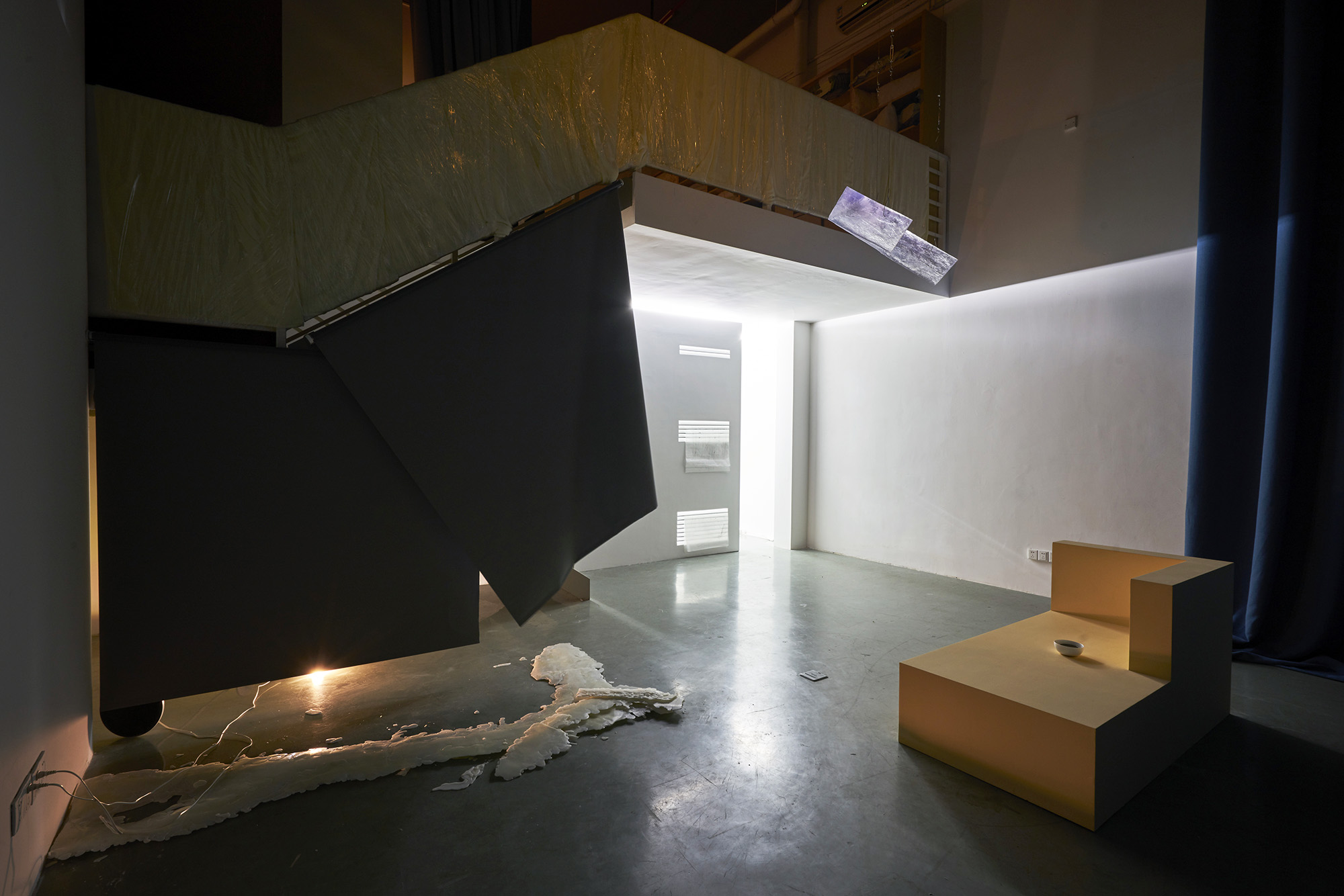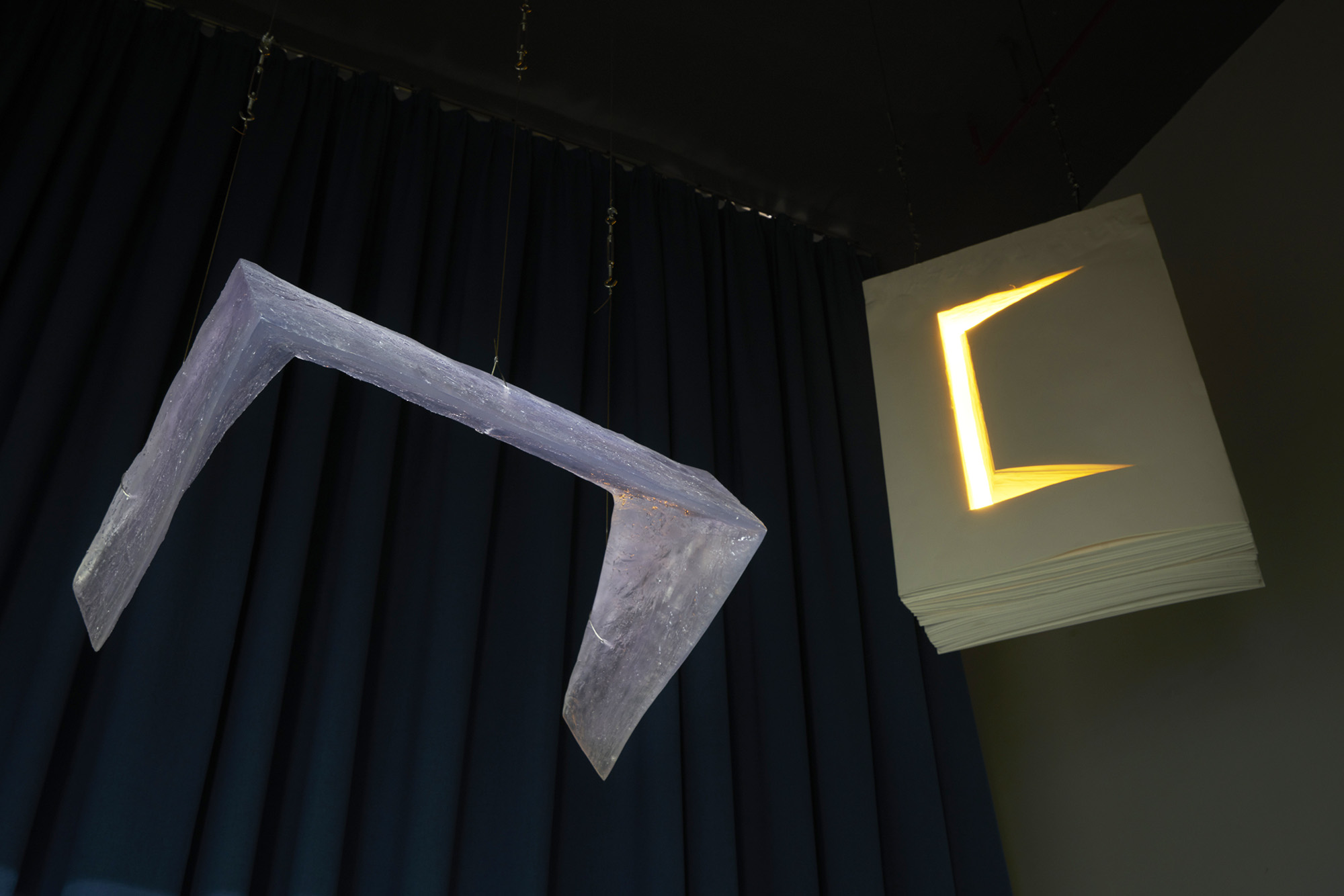Shows
Doreen Chan: "Hard Cream"


A 7.5-meter-long, navy-blue curtain behind the door of HB Station in Guangzhou isolated the space from the outside world. In order to enter the space, one had to laboriously pull this heavy curtain aside first—an act that felt vaguely intrusive, as if one had just stepped into private territory. Indeed, Hong Kong artist Doreen Chan’s solo exhibition “Hard Cream,” co-hosted by HB Station and Hong Kong’s Para Site, the result of a month-long residency in the space, was a temporary time capsule of personal memories, built after a recent tragic breakup. The tiniest shreds of evidence of a life together, so easily erased over time, persisted in the many quotidian objects and sculptures scattered across the intimate landscape of the exhibition.
I learned from the artist that in the first few days of the residency, the duplex had seemed too empty. Thus, she devised ways to effectively shrink the space in order to alleviate her sense of discomfort and loneliness. In addition to the curtain, there was a massive “book,” suspended from the space’s 6.5-meter-high ceiling and with a gash running along its border, revealing a lightbox within. A crudely cut translucent resin sculpture, in the shape of the gash, hung next to it. In the darkened hallways of the space, the single, faint light source from the book provides a semblance of warmth and comfort. Titled Window (all works 2019), the installation references heightened emotions of fear and hope after a domestic dispute. Similar feelings of alienation were also reflected in eight oversized doormats, which Chan placed deliberately on the steps of the staircase. The mats, too large for the steps, droop downward, making it difficult for visitors to ascend or descend. This misplacement alluded to the awkwardness and physical incompatibilities that one might experience when moving into a lover’s living space. Halfway up the stairway, a tilted two-meter-tall wooden box served as a “hidden wall” and partially obstructed the view of the empty cabinet behind it, augmenting the sensation of unease.

While in some works Chan appears to be testing the spatial boundaries of togetherness and loneliness, in others she reveals the lingering memories of co-habitation that remain in the body. On the lower floor were several pieces of layered wax, appearing like broken ice glaciers. Titled 1000 Times, the work was created by pouring wax repeatedly onto the ground as Chan traced—in an anxious manner—the memory of the routes from the bedroom to the kitchen and toilet in the apartment where the couple once lived. While this work actualizes Chan’s physical recollections of a co-living space, it also references the emotional labor required in relationships and artistic practices. Similar gestures were found in Around 5 am, an installation of cabinets with 24 cubby holes featuring either one or two pillows. Fixed by the artist into certain poses—folded, straightened or stacked together—these pillows of different colors and patterns hint at the different sleeping positions of a couple in the early morning. The display not only captures a seemingly insignificant moment in daily life, but also demonstrates a subconscious state of intimacy in a relationship. This intimate state is forcefully removed in an installation facing the cabinets. In The Forgotten Lightness, a stack of heavy glass sits on two-thirds of a bed, flattening a long curtain and bedding beneath it—a silent, irreversibly violent act that eliminates any evidence of sleep or human contact and highlights the specific frustration felt when one’s partner is dismissive or uncommunicative.
Chan’s heavy emphasis on objects in “Hard Cream”—a lonely toothbrush, an outdoor jacket hung on the wall, a stack of perfume boxes—reminded me of a scene in Wong Kar-wai’s film Chungking Express (1994), when one of the protagonists, a police officer, “consoles” his furniture, which in his mind are similarly heartbroken after his failed romance. Although Chan never reveals the facts and details of her own breakup, by illustrating her private, emotional attachments to objects and space in “Hard Cream,” she builds a communal and empathetic bond with her audience.
Pamela Wong is ArtAsiaPacific’s assistant editor.
Doreen Chan’s “Hard Cream” is on view at HB Station, Guangzhou, until August 18, 2019.







